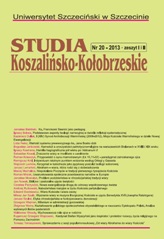Indywiduum istotnym punktem widzenia według Ortegi y Gasseta
The individual is an important point of view according to Ortega y Gasset
Author(s): Remigiusz KrólSubject(s): Contemporary Philosophy, Pragmatism, Existentialism, Behaviorism
Published by: Wydawnictwo Naukowe Uniwersytetu Szczecińskiego
Keywords: Individual; loneliness; life; perspective; different; I; experience; existence; behavior;
Summary/Abstract: In this philosophical reflection entitled The Individual as an Essential Point of View According to Ortega y Gasset, the most eminent Spanish philosopher since the times of Suarez, I make an attempt to take a closer look at the perspective of a human individual. The first question I discuss is an essential loneliness of man. “Loneliness” flows from the construction of being itself, and develops as a result of the irreducibility of two major points of view to each other. The difference lies in the incompatibility of the very perspectives that represent individual people, as well as in what those perspectives define by themselves. Ortega y Gasset perceives the position of man and his realities differently. According to him “I,” by containing in itself a certain perspective, perceives “Another” man. It also makes it possible to discover that “the Other” constitutes a similar entity to „I,” because “the Other” responds to our behavior. The Spanish philosopher notices that a living being, and each of us is a living being, encounters somebody else and recognizes him or her as a kin and kith, calling him another Man. A fundamental quality characteristic of the one whom we call another Man lies in his response, whether the actual or potential one, to my action directed toward him, which forces me to anticipatively take into account his reaction in which, in turn, he has to take into account my action. What we have here is then a novel reality sui Genesis; not mistakable for any other, i.e. an action in which its two subjects participate – I and the other; an action into which the action of somebody else is forced, woven, embedded, and at the same time it is an interaction. My action is then social – in the above mentioned meaning of this word – when I take into consideration a potential reciprocity of the Other in it. The Other, the Man, is abinitio the one who reciprocates, thus being social. One who is not capable of a friendly or hostile reciprocity is not a human being. What follows is that other people are given to each other through experience by external signs such as reactions on the basis of which they draw concrete conclusions about their own existence and behavior. The fact that the Other is given to a man indirectly results in fear and anxiety because it is not possible to make an assumption about or anticipate how he is going to act. The other man always shows up as the joker in the pack, impossible to predict. Therefore this “Other” will appear as a threat also because he possesses some information, an opinion concerning the cognizing “I” whose meaning he does not know. According to him the one who gives us ideas, enlarges our life and extends the realities around us.
Journal: Studia Koszalińsko-Kołobrzeskie
- Issue Year: 2013
- Issue No: 20
- Page Range: 107-115
- Page Count: 9
- Language: Polish

